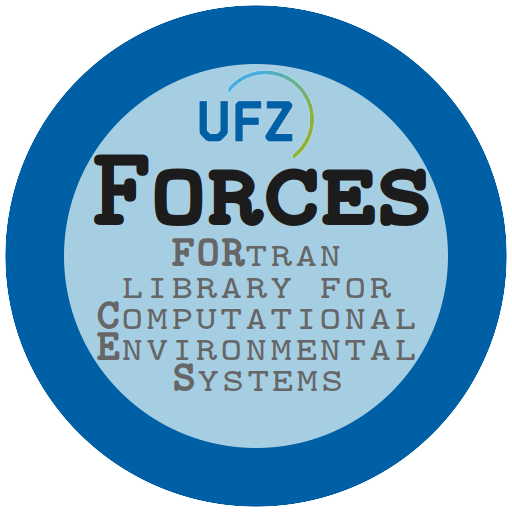 |
FORCES
FORtran lib for Comp. Env. Sys.
|
 |
FORCES
FORtran lib for Comp. Env. Sys.
|
This module is Monte Carlo Markov Chain sampling of a posterior parameter distribution (measurement errors are neither known nor modeled). More...
Public Member Functions | |
| subroutine | mcmc_stddev_dp (eval, likelihood, para, rangepar, mcmc_paras, burnin_paras, seed_in, printflag_in, maskpara_in, tmp_file, loglike_in, paraselectmode_in, iter_burnin_in, iter_mcmc_in, chains_in, stepsize_in) |
This module is Monte Carlo Markov Chain sampling of a posterior parameter distribution (measurement errors are neither known nor modeled).
Sample posterior parameter distribution with Metropolis Algorithm.
This sampling is performed in two steps, i.e. the burn-in phase for adjusting model dependent parameters for the second step which is the proper sampling using the Metropolis Hastings Algorithm.
1. Burn in phase: Find the optimal step size
Purpose:
Find optimal stepsize for each parameter such that the acceptance ratio converges to a value around 0.3.
Important variables:
| Variable | Description |
|---|---|
| burnin_iter | length of markov chain performed to calculate acceptance ratio |
| acceptance ratio | ratio between accepted jumps and all trials (LEN) |
| acceptance multiplier | stepsize of a parameter is multiplied with this value when jump is accepted (initial : 1.01) |
| rejection multiplier | stepsize of a parameter is multiplied with this value when jump is rejected (initial : 0.99 and |
| will never be changed) | |
| stepsize | a new parameter value is chosen based on a uniform distribution |
| pnew_i = pold_i + Unif(-stepsize_i, stepsize_i) (initial : stepsize_i = 1.0 for all i) |
Algorithm:
2. Monte Carlo Markov Chain: Sample posterioir distribution of parameter
Purpose:
use the previous adapted stepsizes and perform ONE monte carlo markov chain
the accepted parameter sets show the posterior distribution of parameters
Important variables:
| Variable | Description |
|---|---|
| iter_mcmc | length of the markov chain (>> iter_burnin) |
| stepsize | a new parameter value is chosen based on a uniform distribution |
| pnew_i = pold_i + Unif(-stepsize_i, stepsize_i) use stepsizes of the burn-in (1) |
Algorithm:
Example
See also example in test directory.
Literature
| [in] | real(dp) :: likelihood(x,sigma,stddev_new,likeli_new) | Interface Function which calculates likelihood of given parameter set x and given standard deviation sigma and returns optionally the standard deviation stddev_new of the errors using x and likelihood likeli_new using stddev_new |
| [in] | real(dp) :: para(:) | Inital parameter set (should be GOOD approximation of best parameter set) |
| [in] | real(dp) :: rangePar(size(para),2) | Min/max range of parameters |
| [in] | integer(i8), optional :: seed_in | User seed to initialise the random number generator (default: none --> initialized with timeseed) |
| [in] | logical, optional :: printflag_in | Print of output on command line (default: .False.) |
| [in] | logical, optional :: maskpara_in(size(para)) | Parameter will be sampled (.True.) or not (.False.) (default: .True.) |
| [in] | character(len=*), optional :: tmp_file | filename for temporal data saving: every iter_mcmc_in iterations parameter sets are appended to this file the number of the chain will be prepended to filename output format: netcdf (default: no file writing) |
| [in] | logical, optional :: loglike_in | true if loglikelihood function is given instead of likelihood function (default: .false.) |
| [in] | integer(i4), optional :: ParaSelectMode_in | How many parameters will be changed at once?
|
| [in] | integer(i4), optional :: iter_burnin_in | Length of Markov chains of initial burn-in part (default: Max(250, 200*count(maskpara)) ) |
| [in] | integer(i4), optional :: iter_mcmc_in | Length of Markov chains of proper MCMC part (default: 1000 * count(maskpara) ) |
| [in] | integer(i4), optional :: chains_in | number of parallel mcmc chains (default: 5_i4) |
| [in] | real(dp), DIMENSION(size(para,1)), optional :: stepsize_in | stepsize for each parameter if given burn-in is discarded (default: none --> adjusted in burn-in) |
| [out] | real(dp), allocatable :: mcmc_paras(:,:) | Parameter sets sampled in proper MCMC part of algorithm |
| [out] | real(dp), allocatable :: burnin_paras(:,:) | Parameter sets sampled during burn-in part of algorithm |
Definition at line 419 of file mo_mcmc.F90.
| subroutine mo_mcmc::mcmc_stddev::mcmc_stddev_dp | ( | procedure(eval_interface), intent(in), pointer | eval, |
| procedure(objective_interface), intent(in), pointer | likelihood, | ||
| real(dp), dimension(:), intent(in) | para, | ||
| real(dp), dimension(:, :), intent(in) | rangepar, | ||
| real(dp), dimension(:, :), intent(out), allocatable | mcmc_paras, | ||
| real(dp), dimension(:, :), intent(out), allocatable | burnin_paras, | ||
| integer(i8), intent(in), optional | seed_in, | ||
| logical, intent(in), optional | printflag_in, | ||
| logical, dimension(size(para, 1)), intent(in), optional | maskpara_in, | ||
| character(len = *), intent(in), optional | tmp_file, | ||
| logical, intent(in), optional | loglike_in, | ||
| integer(i4), intent(in), optional | paraselectmode_in, | ||
| integer(i4), intent(in), optional | iter_burnin_in, | ||
| integer(i4), intent(in), optional | iter_mcmc_in, | ||
| integer(i4), intent(in), optional | chains_in, | ||
| real(dp), dimension(size(para, 1)), intent(in), optional | stepsize_in | ||
| ) |
Definition at line 1289 of file mo_mcmc.F90.